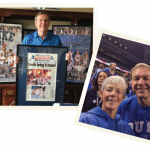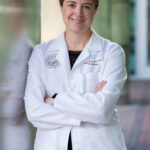This is the second part in our ACR committee profile series.
Committee Composition
Fifteen volunteers make up the Committee on Research (COR), and they come from diverse backgrounds. “The committee includes representatives from basic research and clinical research, as well as health service researchers, pediatric rheumatologists, and a rheumatology fellow,” explains committee chair E. William St. Clair, MD, professor of medicine at Duke University Medical Center in Durham, N.C. “There are members who represent the ARHP, the Arthritis Foundation, and the ACR Research and Education Foundation. We also have a liaison to the [ACR] Government Affairs Committee, and to NIAMS [National Institute of Arthritis and Musculoskeletal and Skin Diseases] and NIAID [National Institute of Allergy and Infectious Diseases]. This diverse membership allows us to address research from multiple points of view.”
“Any member can identify their interest in joining the committee through the ACR Web site,” stresses Dr. St. Clair. “My impression is that we have a lot of potential volunteers out there. There’s a lot of interest in serving on ACR committees.”
The entire COR meets on a regular basis, including two face-to-face meetings each year and several conference calls; its subcommittees may hold additional calls.
At the Helm
Committee Chair Dr. St. Clair volunteered for COR in 2004 and served one year before being appointed its chair. He previously served on ACR’s Annual Scientific Meeting Planning Committee and the Education Committee.
“I have a background in both basic and, primarily, clinical research,” he says, “but I spend most of my time now at the bedside working on studying new therapies for rheumatoid arthritis and other rheumatic diseases.”
During his first year on COR, Dr. St. Clair led an important initiative: “My task during that … year was to help develop a research agenda [for ACR], which would define our research priorities for upcoming years,” he explains. “I convened a working group and we fleshed out a draft of the agenda” in a series of conference calls. After receiving comments from the membership, the ACR board approved the agenda in the fall of 2005 after a public comment phase.
“The fallout is that we’re now faced with developing a strategy for the implementation of that agenda,” says Dr. St. Clair. The final research agenda will shape COR’s focus and tasks for years to come.
Ambitious Agenda
The COR agenda lays out research priorities, including etiology of disease, mechanisms of disease, and advances in therapy. It also makes recommendations for future research.
“Our initiative this year has been to implement the agenda,” says Dr. St. Clair. “There are three areas, each defined by a subcommittee: funding opportunities, clinical research infrastructure, and awareness. Their efforts will lead to a number of action items that the committee will take before the ACR board of directors over the next year.” COR will develop action items from the efforts of those subcommittees.
“One of our first projects was a white paper developed by [Clifton Bingham III, MD, assistant professor of medicine in the rheumatology division at Johns Hopkins University in Baltimore] and his subcommittee, on the appropriate training of clinical investigators,” says Dr. St. Clair. “This was brought to the board in early 2007.”
Promoting Research to Members
A major COR initiative is promoting basic and clinical research. “An important way the ACR promotes research is at the Annual Scientific Meeting,” says Dr. St. Clair. Specifically, COR is responsible for two pre-meetings offered at the Annual Scientific Meeting: a Basic Research Conference and a Clinical Research Conference.
“The topics and chairs for the Basic Research Conference and Clinical Research Conference are selected by COR,” explains Dr. St. Clair. “The topics are chosen because of their importance to the field of rheumatology and scientific interest. Leaders in the field are selected as chairs, who then organize the program and select the speakers.”
The Basic Research Conference has been enormously successful, adding considerably to the vitality of the basic science available at the Annual Scientific Meeting. “An important goal of the basic research conference is to provide a venue for established investigators to interact with young investigators, creating opportunities for mentoring and stimulating excitement about research among the trainees,” points out Dr. St. Clair. “Also, we invite leaders in the field who are presenting at the Basic Research Conference pre-meeting to speak at the annual meeting, further enriching the portfolio of basic science presentations available to our membership.”
The ACR Basic Research Conference is now a permanent fixture of the annual meeting. The focus of the 2007 conference is is “Musculoskeletal Engineering and Regeneration,” chaired by Rocky S. Tuan, PhD, from NIAMS and Rank Luyten, MD, PhD, from Katholieke Universitet in Belgium.
In comparison, the Clinical Research Conference is relatively new; the 2006 Scientific Meeting was its third year. It has also been very successful, largely due to the efforts of initial conference organizer Edward Yelin, PhD, professor of medicine in the rheumatology division at the University of California, San Francisco, says Dr. St. Clair.
The Clinical Research Conference, which is now a permanent fixture of the ACR annual meeting, has goals similar to the Basic Research Conference. The 2007 conference will focus on drug safety, and is chaired by Daniel H. Solomon, MD, MPH, assistant professor of Medicine in the division of rheumatology, immunology, and allergy at Brigham & Womens Hospital in Boston.“The chair, who is an expert in the field, organizes the program, and selects the speakers,” explains Dr. St. Clair.
Additional Goals
In addition to implementing the research agenda and providing two pre-meetings on research each year, COR continues to focus on several ongoing goals. One is to preserve and grow the rheumatology research infrastructure. “We’ve moved forward on that initiative with the white paper,” says Dr. St. Clair.
The committee also focuses on providing leadership and guidance for new researchers through its young investigators subcommittee. The subcommittee was formed two years ago and has eight ACR members who are not members of COR. “We were charged with helping the young investigator constituency,” says young investigator representative Christy C. Park, MD, assistant professor of rheumatology at Northwestern University Feinberg School of Medicine in Chicago. “We started from scratch; we thought we should gauge the interest in a career in research among younger members, starting with fellows.” The subcommittee has conducted two surveys of rheumatology fellows and is analyzing the results thoroughly. “We asked what factors made them choose academic research,” explains Dr. Park, “and we asked a lot of open-ended questions, too. A one-to-five rating doesn’t really give all the answers.”
Dr. St. Clair explains, “We’re studying career outcomes of physician investigators, identifying young investigators in the ACR, and examining what factors lead to their success as academic investigators. The answers will help us develop strategies to help them succeed.”
The subcommittee also presented a special session for fellows on academic research for the second time at the scientific meeting in November. “This was very well attended last year,” says Dr. Park. “We hope that this brings some visibility to our group, so that [the fellows] can voice their concerns to us.”
Another initiative of the young investigators is recognizing mentorship. “We recommended to the REF a new award recognizing mentorship,” says Dr. Park. “We want to highlight the importance of mentoring with the Investigative Mentorship Award [given for the first time in November 2006].”
Impact of the Committee
The work that the entire COR does has a direct influence on rheumatology research and, by extension, on ACR members and other practicing rheumatologists. “By its nature, the main impact of the committee is on the research community, although ultimately, research activities [affect practicing rheumatologists] by helping develop novel therapeutics,” says former committee member Gary Firestein, MD, professor of medicine and chief of rheumatology at the University of California, San Diego. “The committee helps to identify new areas of research, new collaborations with other organizations, unmet medical needs where our organization can begin to focus attention, and funding opportunities in an area where research funding is badly needed.”
Dr. St. Clair adds, “By supporting basic and clinical research, our efforts can directly lead to improvements in care of patients and advances in the diseases we see every day. We’re also very supportive of the training of academic rheumatologists; the committee tends to support that subgroup and thus improve quality of care.”
Jane Jerrard is writing the series on ACR committees.


